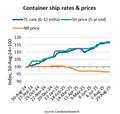Baltiysky Zavod JSC
Baltiysky Zavod JSC, also known as Baltic Shipyard, is one of Russia's largest and most prominent shipbuilding companies. Founded in 1856 and located in St. Petersburg, the shipyard has a long history of constructing various types of ships, ranging from commercial vessels to icebreakers and military ships. Here are some key points about the company:
Historical Significance: Baltiysky Zavod has a rich heritage and has played a crucial role in the development of the Russian and Soviet navies. Over its long history, the shipyard has constructed numerous significant vessels, including battleships, aircraft carriers, and submarines.
Types of Vessels:
- Nuclear Icebreakers: The shipyard is renowned for its construction of nuclear-powered icebreakers, which are essential for navigation in the Arctic region. These vessels enhance Russia's capabilities in ice navigation and resource extraction in the Arctic.
- Commercial Ships: Baltiysky Zavod produces a variety of commercial vessels, such as oil tankers, container ships, and cargo vessels.
- Military Ships: The company also constructs naval vessels including frigates, destroyers, and support ships for the Russian Navy.
Technological Capabilities: The shipyard is equipped with modern facilities and employs advanced technologies for shipbuilding, including automated production lines and state-of-the-art design software. This allows them to meet high standards in ship construction and to fulfill both domestic and international orders.
Key Projects:
- Arktika-Class Icebreakers: These are some of the most powerful nuclear-powered icebreakers in the world, designed for year-round navigation in the Arctic.
- Floating Nuclear Power Plants: Baltiysky Zavod has also ventured into constructing floating nuclear power plants to provide electricity to remote regions.
Strategic Importance: The company holds a strategic position in Russia's maritime industry and contributes significantly to the country's ability to operate in the Arctic. It also plays a role in maintaining and expanding the capabilities of the Russian Navy.
Ownership and Management: The shipyard is part of the United Shipbuilding Corporation (USC), which is a state-owned enterprise that consolidates most of Russia's shipbuilding assets.
International Presence: While primarily servicing the Russian market, Baltiysky Zavod also engages in international projects and exports its vessels and services globally.
Overall, Baltiysky Zavod JSC is a cornerstone of Russian shipbuilding, with extensive experience and capabilities in designing and constructing a wide range of maritime vessels. Its strategic contributions are vital to Russia's naval and commercial maritime industries.
- +7 812 324 92 54
- www.bz.ru
- +7 812 327 71 90
Products
St.Petersburg Russia
St.Petersburg
Russia
Ships
MAXIMUS
Barge | Flag: United States of America | Port: NEW ORLEANS, LA
Maritime News

Shipbuilding - JV Company Orders Containership Pair

Trump Administration Drops Gauntlet on UN Fuel Rules, Threatens Tariffs

Second-hand Containership Prices Soar in the Face of Soft Shipping Rates

“2 Days, 50 Ports”: New Wave Media Acquires Port of the Future Conference & Exhibition
